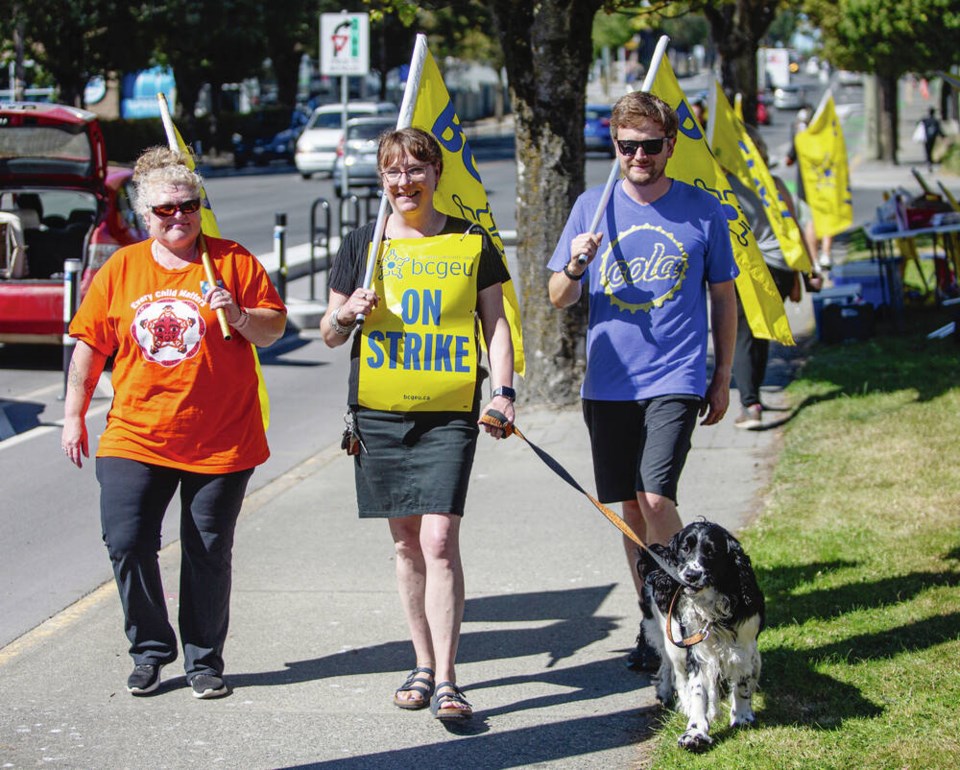With almost 400,000 public sector workers bargaining with the government over wages this year, experts say the strike by the BCGEU could have a domino effect as unions push for pay that keeps up with inflation.
The Professional Employees Association signalled it could join the British Columbia General Employees’ Union on the picket line after the union representing government licensed professionals issued a 72-hour strike notice Wednesday at noon.
The union, which represents 1,200 professionals, including agrologists, engineers, foresters, geoscientists, pharmacists, psychologists and veterinarians, said it is emboldened by the BCGEU’s targeted strike, which started Monday.
“The BCGEU is leading the way with putting up pickets at the liquor distribution plants,” said Melissa Moroz, a labour relations officer with the Professional Employees Association. “We will be adding to that momentum and that escalation of job action.”
Moroz did not provide details of what the legal strike could look like.
The union started bargaining with the Public Service Agency on April 11 and reached an impasse on May 16, the union said, when the wage increases offered by the government failed to address the rising cost of living. Union members voted 92 per cent in favour of a strike in June.
The union is asking for a five per cent wage hike in each of the three years, or cost of living adjustments, whatever is greater, Moroz said.
“People don’t join a union to go backward” relative to cost of living, she said.
Moroz said the professional employees rebuild bridges and roads, monitor B.C.’s forests and agriculture, and provide care to vulnerable youth. Under the Labour Relations Code, essential workers, such as pharmacists and psychologists, cannot go on strike, she said.
The BCGEU, which represents 33,000 provincial government workers, was in its third day of targeted strike Wednesday, with 950 liquor distribution and wholesale workers picketing. That means no liquor or cannabis products are being distributed to B.C. businesses.
About 50 people from 10 unions picketed in front of the Liquor Distribution Branch’s Victoria wholesale customer centre on Wednesday.
As she waved to honking cars passing by, BCGEU president Stephanie Smith said because the BCGEU was first out of the gate to begin bargaining, their actions set the tone for other unions fighting for better pay.
“We may be sort of the first domino,” she said. The ball is now in the government’s court, but “the silence has been deafening.”
The BCGEU’s bargaining team rejected the Public Service Agency’s most recent offer of a 10.99 per cent pay hike over three years plus a one per cent cost of living adjustment. Employees would also get a $2,500 signing bonus.
The Finance Ministry said the cost of living adjustment “will vary somewhat across the public sector depending on the average hourly wage of each bargaining unit because the mandate is designed to provide an extra lift to the lowest paid workers who are hardest hit during periods of high inflation.”
The union wants wages tied to inflation, which it says is the deal offered to MLAs.
Labour expert Mark Thompson, a professor emeritus at the University of British Columbia’s Sauder School of Business, said with the Professional Employees Association’s strike threat, it’s clear pressure is building on the government to deliver compensation that keeps up with the rising cost of living.
The BCGEU will be trying to match the deal given to Sea to Sky bus drivers in Squamish, Whistler and Pemberton, Thompson said" a pay raise of 13.5 per cent over five years plus a signing bonus and a cost of living clause.
The union, Unifor, praised the “groundbreaking” adjustment recommended by special mediator Vince Ready, which gives workers paid a top up if inflation exceeds the workers’ raises.
“What union would go to its members, when inflation has reached seven per cent, to say: ‘Let’s settle for 3 1/2 per cent for three years?’ ” Thompson asked. “They’d run them out of town on a rail. That’s ridiculous.”
Almost all of the 400,000 unionized workers in the provincial public sector have contracts that expire this year.
The Hospital Employees Union, which represents more than 50,000 health care workers, said “despite strong momentum at the bargaining table” it would take a pause from bargaining in solidarity with the BCGEU.
The Finance Ministry did not give specifics as to what the 10.99 per cent wage hike over three years offered to the BCGEU would cost taxpayers.
However, it did say that wages for the province’s 400,000 public sector employees costs $38.6 billion, or more than half of the province’s budget. A one per cent increase for all unionized employees across the entire public sector would cost about $311 million a year, the Finance Ministry said.



